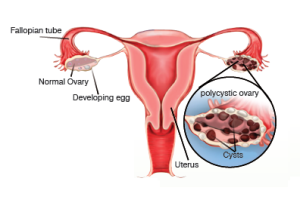PCOS
 What is Polycystic Ovary Syndrome?
What is Polycystic Ovary Syndrome?
The ovaries are responsible for producing eggs and the female hormones estrogen and progesterone. Any imbalance in these hormones where there’s too little estrogen or too much of male hormones, can cause PCOS.
PCOS can make it more difficult for women to become pregnant. (They may have missed or irregular menstrual cycles or periods.) Small cysts, or fluid filled sacs, can also grow in the ovaries where eggs are made. These cysts make it hard for eggs to leave the ovary (called ovulation).
| In Normal Ovary | In Polycystic Ovary | Each month, about 20 follicles start to grow; usually only one matures. | Follicles grow, but none mature; some remain as cysts |
| Follicle: Sac full of fluid surrounding egg | Body does not make hormones for an egg to mature |
| At Ovulation, mature egg is released from follicle, moves into fallopian tube. Mature follicles releases progesterone; uterine lining thickens, period follows. |
No egg released, no progesterone produced, uterine lining doesn’t thicken. |
How many women suffer from PCOS?
1 in 10 and 1 in 20 women of childbearing age has PCOS. It can occur in girls as young as 11 years old.
What are the signs & symptoms of PCOS?
You may have one or more of these signs:
- Infertility or not able to become pregnant
- Irregular menstrual cycle (period)
- Pelvic pain
- More hair growth on the body
- Acne or oily skin, or dandruff
- Overweight or weight gain, especially around the waist
- Thick, dark patches of skin appear on the neck, armpits, skin folds and on the insideof the upper leg.
- Less common symptoms may include thinning hair, tiny skin growths (skin tags) in the armpits or neck area.
How do I know if I have PCOS?
There is no single test to diagnose PCOS. Your doctor will take the following steps to find out if you have PCOS or if something else is causing your symptoms.
– Medical history. Your doctor will ask about your menstrual periods, weight changes & other symptoms.
– Physical exam. Your doctor will want to measure your blood pressure, body mass index (BMI), & waist size. He or she also will check the areas of increased hair growth. You should try
– Balance carbohydrates with protein & healthy fats.
– Eat small meals and snacks throughout the day instead of large meals.
– Exercise regularly to help manage insulin levels and your weight.
Regular health checks
– Women with PCOS over the age of 40 should be offered a blood sugar test once a year to check for signs of diabetes.
– After the menopause it would be wise to have regular cholesterol and blood pressure checks so early signs of disease can be treated.
Product Information
- Ovacare – Enhances effectiveness of infertility treatment in females.
- Ovacare Forte – The Polycystic Ovary Specialist
- Oligocare – For Positive Outcome in Treatment of Male Infertility
- Oligocare Forte – fortifies sperms for conception
- Pregnacare – Prenatal supplement with 17 important vitamins and minerals
